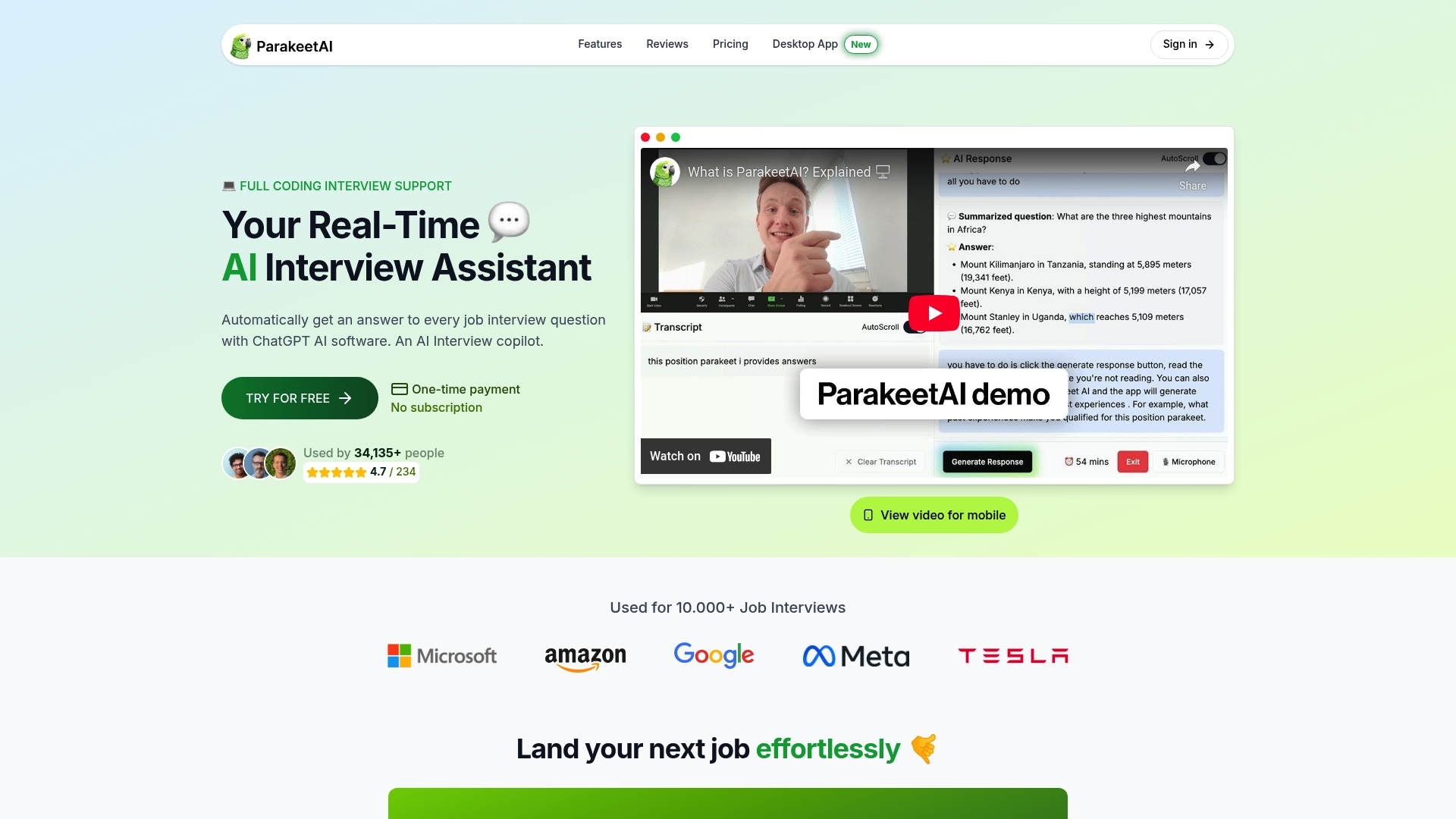Interview Confidence Tips for Acing Your Next Job

Did you know that nearly 92 percent of professionals feel some level of anxiety before a job interview? Landing the right job often hinges on how well you prepare—not just your answers, but your mindset and delivery too. With rapid changes in interview formats and the rise of AI tools, mastering the full preparation process can help you stand out and walk in with real confidence.
Table of Contents
- Step 1: Assess Your Interview Mindset
- Step 2: Prepare Responses With AI Support
- Step 3: Practice Answers In Real-Time Scenarios
- Step 4: Refine Delivery Using Instant Feedback
- Step 5: Verify Confidence With Mock Interviews
Quick Summary
| Key Point | Explanation |
|---|---|
| 1. Assess your interview mindset | Evaluate your mental state to manage anxiety effectively before interviews. |
| 2. Use AI for response crafting | Leverage AI tools to refine your authentic interview answers without losing your unique voice. |
| 3. Practice in real-time scenarios | Simulate authentic interview conditions to build confidence and improve response speed. |
| 4. Seek constructive feedback | Gather objective feedback from trusted professionals to enhance communication skills and eliminate barriers. |
| 5. Conduct diverse mock interviews | Participate in varied mock interviews to strengthen adaptability and boost overall confidence. |

Step 1: Assess your interview mindset
Your interview mindset is the foundation of your success. Before walking into any interview, understanding and calibrating your mental approach can dramatically improve your performance and confidence. This step is about honestly evaluating your current mental state and preparing yourself psychologically for the challenge ahead.
Start by conducting a personal self assessment. Ask yourself critical questions: What are my biggest interview fears? Where do my confidence gaps exist? Are past rejections holding me back? Most professionals experience some level of interview anxiety, but recognizing these feelings allows you to strategically address them. How to Overcome Interview Anxiety: Top Tips to Succeed suggests that acknowledging your anxieties is the first step toward managing them effectively.
Practical mental preparation involves visualization and positive reframing. Instead of viewing the interview as a high stakes interrogation, see it as a collaborative conversation where you are demonstrating your skills and potential. Imagine yourself responding calmly and articulately to questions. Picture the interviewer nodding and engaging positively with your responses. This mental rehearsal can significantly reduce anxiety and boost your confidence. Remember that interviewers are hoping you will be the right candidate they want to hire.
A powerful technique is to develop a pre interview ritual that centers and grounds you. This might include deep breathing exercises, listening to motivational music, or reviewing your key strengths and accomplishments. The goal is to enter the interview feeling calm, prepared and authentically confident.
Step 2: Prepare responses with AI support
AI has revolutionized interview preparation by offering sophisticated tools to help you craft compelling responses. This step focuses on leveraging AI technology strategically while maintaining your authentic professional voice. The goal is to use AI as a supportive tool that enhances your preparation without replacing your unique personal narrative.
Begin by understanding the boundaries of AI assistance. Careers State Department warns against completely outsourcing your response creation. Instead, use AI as a collaborative partner. Input your professional experiences and key achievements, then let AI help you structure and refine your responses. This approach ensures your answers remain genuine while benefiting from AI’s language optimization capabilities.
When using AI support, focus on specific techniques. How AI Answers Interview Questions: Understanding the Process suggests using AI to help you generate response frameworks, practice potential question scenarios, and identify strong language for articulating your skills. Draft your initial response independently, then use AI to help you polish your wording, eliminate unnecessary jargon, and ensure your message is clear and impactful.
A critical tip is maintaining your personal voice. AI should enhance not replace your authentic communication style. Review and personally modify any AI generated content. Read the suggestions out loud to ensure they sound like you. The most effective interview responses blend professional polish with personal authenticity.
Step 3: Practice answers in real-time scenarios
Real time practice transforms interview preparation from theoretical knowledge to genuine performance readiness. This critical step helps you develop muscle memory for responding quickly and confidently under actual interview pressure. Your goal is to simulate authentic interview conditions that mirror professional interactions.
Design your practice sessions strategically by leveraging Mock Interview Questions and Answers to Ace Your Interview resources. Start by creating a structured practice environment that mimics professional interview settings. This means dressing professionally, setting up a quiet space, and using video recording to review your performance. Practice responding to standard and behavioral questions out loud while maintaining eye contact with a camera or practice partner. Focus on clarity concision and demonstrating your professional narrative.
Timing and spontaneity are key elements of successful interview practice. Challenge yourself with unexpected questions and practice responding without excessive preparation. This builds mental agility and helps you become comfortable with thinking on your feet. Record these practice sessions and critically review your body language vocal tone and response structure. Pay attention to filler words nervous gestures and moments where you might seem hesitant. Each practice round is an opportunity to refine your communication skills and build genuine interview confidence.
A powerful technique is to vary your practice scenarios. Recruit friends family members or professional colleagues to conduct mock interviews. Each different interviewer will bring unique communication styles helping you become more adaptable. The more diverse your practice experiences the more prepared and resilient you will become in actual interview settings.

Step 4: Refine delivery using instant feedback
Refining your interview delivery is a dynamic process that requires honest self assessment and targeted improvements. This step focuses on transforming your raw practice sessions into polished professional communication by leveraging immediate constructive feedback. The goal is to identify and eliminate communication barriers that might prevent you from presenting your best self.
Begin by creating a structured feedback mechanism. How to Conduct Mock Interviews recommends establishing a trusted network of professionals who can provide objective observations. This might include mentors colleagues or career coaches who understand interview dynamics. Ask them to evaluate specific aspects of your performance such as verbal clarity body language confidence level and response coherence. Request them to provide timestamped video feedback that allows you to pinpoint exact moments needing improvement.
Technology can be a powerful ally in your feedback process. Use screen recording and video analysis tools to capture nuanced details about your communication style. Watch your recordings with a critical yet compassionate eye. Pay attention to unconscious gestures vocal inflections and pacing that might distract from your message. Look for patterns such as overusing filler words rushing through responses or displaying nervous energy. Each observation is an opportunity for refinement not a critique of your inherent capabilities.
A transformative approach is to treat feedback as a learning opportunity rather than personal criticism. Break down your improvement process into manageable chunks. Focus on one communication aspect at a time whether its maintaining eye contact reducing verbal hesitation or structuring more concise responses. Practice the identified skill repeatedly until it becomes a natural part of your interview persona. Remember that professional communication is a skill that can be learned and mastered with consistent effort and mindful practice.
Step 5: Verify confidence with mock interviews
Mock interviews are your final proving ground for interview confidence and performance readiness. This critical step transforms all your previous preparation into a realistic simulation that exposes potential weaknesses and reinforces your professional narrative. Your objective is to create an environment that closely mirrors actual interview conditions and critically evaluate your overall presentation.
How to Conduct Mock Interviews - ParakeetAI recommends developing a comprehensive mock interview strategy that goes beyond simple question and answer practice. Seek out diverse interview scenarios that challenge you in different professional contexts. This might include behavioral interviews technical screenings panel discussions and unexpected stress tests. Recruit professionals from your industry who can provide authentic and rigorous evaluation. Ask them to assess not just your content but your entire communication approach including nonverbal cues professional demeanor and ability to think critically under pressure.
Technology can significantly enhance your mock interview experience. Record these practice sessions from multiple angles to capture your full communication profile. Analyze your video recordings with a critical yet constructive mindset. Look for subtle details in your body language vocal tone and response structure. Pay attention to moments of hesitation unexpected pauses or instances where your confidence wavers. Each observation is an opportunity for targeted improvement not a reason for self criticism.
The ultimate goal of mock interviews is building genuine confidence through realistic preparation. Treat each mock interview as a learning experience that incrementally builds your professional communication skills. After each session take time to reflect review feedback and make specific adjustments. The more you expose yourself to varied interview scenarios the more adaptable and self assured you will become. Your confidence will emerge not from memorized scripts but from a deep understanding of your professional capabilities and how to communicate them effectively.
Boost Your Interview Confidence with Real-Time AI Support
Mastering your interview mindset and practicing responses can be tough when nerves take over or feedback feels uncertain. This article highlights key challenges like managing anxiety, refining your delivery, and building genuine confidence. If you want to break free from hesitation and sharpen your communication skills, it is crucial to have insightful, instant guidance during practice.

Take advantage of a real-time AI job interview assistant that listens as you answer and provides smart, tailored responses to every question. This tool lets you combine your authentic voice with AI’s strengths to polish your answers and gain clarity on moments that need improvement. Explore how to transform stressful preparation into confident, professional presence by visiting Parakeet AI. Start practicing effectively today and face your next job interview fully prepared with How to Conduct Mock Interviews and Mock Interview Questions and Answers to Ace Your Interview. Your path to interview success begins now at Parakeet AI.
Frequently Asked Questions
How can I assess my interview mindset effectively?
To assess your interview mindset, start by identifying your biggest fears and past rejections that may affect your confidence. Reflect on these feelings before your interview and create a personal strategy to address them, such as setting a calming pre-interview ritual.
What techniques can I use to prepare my responses for an interview?
Use AI technology to help structure and refine your interview responses while ensuring they reflect your personal voice. Begin by drafting your responses based on your experiences, and then let AI assist in polishing your wording to make it clearer and more impactful.
What should I include in my mock interview practice sessions?
Design your mock interview practice sessions to mimic real interview conditions, including dressing professionally and using video recording. Incorporate both standard and unexpected questions to improve your adaptability and build confidence in your responses.
How can I get constructive feedback on my interview performance?
Create a feedback mechanism by involving trusted colleagues or mentors who can provide honest evaluations on your communication style. Ask them to focus on key areas such as body language, clarity, and coherence, and use their input to make targeted improvements.
What is the role of mock interviews in building my confidence?
Mock interviews serve as realistic simulations that expose areas for improvement and reinforce your communication skills. Treat each mock interview as a learning experience, adapting based on feedback to build genuine confidence ahead of your actual job interview.
How can I handle interview anxiety before my interview?
To manage interview anxiety, practice visualization techniques where you imagine responding calmly and positively during the interview. Incorporate a pre-interview ritual that centers your thoughts, such as deep breathing or reviewing your accomplishments, so you feel more prepared and confident.




